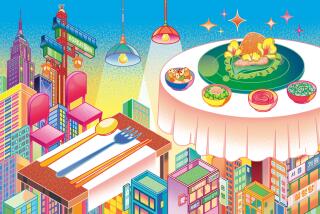South Korea’s kimchi deficit
There’s probably no nation in the world more emblematic of the pitfalls and challenges of rapid modernization than South Korea. South Korean society is a caldron of competition and contradiction, caught between respecting the past and striving for the future.
And now it seems this nation -- which worked its way from the Third World to the First World in a single generation, and whose people show the strain by working more hours, consuming more hard liquor, having more sex and committing more suicides than in any other country -- is facing another culture clash between traditional identity and a globalizing world: the kimchi deficit.
It’s difficult to overestimate the cultural significance of kimchi in South Korean society. It’s the national staple: cabbage fermented in garlic, chilies and vinegar. More than just food to Koreans, kimchi is a cultural icon and a national treasure. In Seoul, you can meander through a museum dedicated to promoting its history and beneficial qualities.
Earlier this year, when the first South Korean astronaut ventured into space, three government research institutes spent millions to develop bacteria-free kimchi to send with him into orbit. “If a Korean goes to space, kimchi must go there too,” one scientist told a reporter.
Recently, the Ministry of Agriculture threw its weight behind a $40-million public-private campaign to make Korean cuisine as famous as French, Japanese, Thai, Chinese and Italian, and spreading the gospel of kimchi is no doubt central to the strategy.
In addition to establishing Korean culinary schools abroad, the goal is to quadruple the number of Korean restaurants around the globe by 2017.
But last week, a report to the South Korean parliament revealed a flaw in the nation’s culinary ambitions: the country’s kimchi trade deficit.
It seems that growing domestic demand for cheap, Chinese-made fermented cabbage has led to a 376% surge in imported kimchi from 2004 to 2007. For those three years, South Korea’s kimchi trade deficit reached $77.3 million. The national symbol -- what one writer called “the palpable expression of the country’s feisty spirit” -- is now more likely to be made in China than at home.
Everyone knows that eating is not just about satisfying a physiological need. It also serves a psychological and social function. Food plays a primary role in how people create and maintain their identities. We define each other by the foods we eat. As one scholar has put it, food binds “taste and satiety to group loyalties. Eating habits both symbolize and mark the boundaries of culture.”
But just as much as it binds us to an identity and a place, food is transportable and even mutable. For good and ill, once I find out about your favorite food, I can cook it and eat it myself. I might even put my own stamp on it. I might even sell it back to you. You might like my version better than yours.
In the U.S., ethnic food consumption has risen dramatically over the last quarter of a century. Sociologists disagree about what significance this “internal tourism” has for our society -- does a growing hunger for foreign foods make us all budding internationalists? And if we’re eating kimchi, will it, as the South Korean government seems to believe, translate into greater influence and respect for South Korea?
So far, the debate over the cultural consequences of globalization has been primarily about the evils and benefits of “McDonaldization” (stultifying homogenization) or, in novelist Salman Rushdie’s term, “chutneyfication” (glorious mixture). But South Korea’s concern over its kimchi deficit points to a much more subtle and potentially menacing dynamic of modern life. What happens when that which you consider to be yours exclusively begins to come from somewhere else?
If you think this is a silly question, just remember that it was a feeling of cultural displacement that helped fuel the fundamentalism of Egyptian student Mohamed Atta in Germany. In times of great change, people tend to cling to what they think are the fundaments of their culture and religion.
South Korea’s kimchi deficit could point to a future in which we are all acutely aware of how intertwined we are. But it could also presage increased personal confusion, displacement and anxiety, and a provincial cultural retrenchment.
Chinese-made kimchi could carry the pungent smell of a contentious future.
grodriguez@latimescolumnists.com
More to Read
A cure for the common opinion
Get thought-provoking perspectives with our weekly newsletter.
You may occasionally receive promotional content from the Los Angeles Times.






